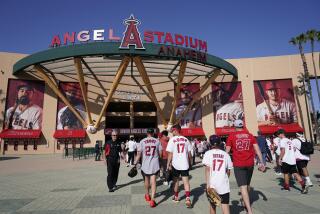Anaheim’s NFL Pitch Is Blindsided by Blitz
Interrupting a news conference promoting Anaheim as the best of four competing sites for an NFL stadium, a city councilman said Tuesday he vehemently opposed giving valuable land to the league, declaring that taxpayer money was being “blown up.”
Councilman Harry Sidhu unexpectedly walked to the lectern toward the end of an hourlong presentation, saying, “People should know the truth.” He later said he felt compelled to speak after having been “shut out” of the news conference and the negotiations with the NFL.
Anaheim has the right to develop 40 acres of the Angel Stadium parking lot, a parcel Sidhu estimated could be sold for $150 million. Sidhu said he objected to giving even a portion of that land to the NFL because the city could make more money selling it.
“The NFL is not the right thing to do,” he said. “I believe the taxpayers’ money is going to be abused. The return on the money is just not there.”
Sidhu said the money that could be generated by selling the land next to Angel Stadium could be used to hire more police officers and for improvements around the city.
But Anaheim Mayor Curt Pringle, while not disclosing the terms being discussed, said the general fund would not be put at risk and that the benefits of being the home city of an NFL team outweighed the potential costs.
“Some people may have different opinions,” Pringle said. “It’s challenging when folks perk up without full knowledge of what’s going on.”
The presentations featured a comparative analysis of the competing sites -- the Rose Bowl, Carson, Anaheim and the Coliseum -- two weeks before NFL owners will meet in Washington in part to discuss the prospects of putting a team in the Los Angeles area. The league is expected to choose a stadium site or narrow the field at the May 24-25 meetings.
Sidhu and the other members of the council attended the news conference at Anaheim City Hall and sat quietly though most of it. Sidhu stepped up near the end, during a question-and-answer session with the media.
Afterward, fellow Councilman Bob Hernandez said he agreed with most of what Sidhu had said.
“There would be an economic benefit with the NFL,” Hernandez said. “But that’s not the same as a great return on an investment. I’m not willing to give that land for free. I know enough about the negotiations to be concerned about where they might be going.”
Pringle said that negotiations would not have gotten this far unless the city had the majority support of the five-member council, of which he is a part.
“Our city staff is not going to negotiate something they don’t have three votes for,” he said.
Pringle added, “If we have a Super Bowl or two, that would be one heck of an economic boon to Anaheim and Southern California. Sometimes you use your assets to build toward the future.”
The Angels were not invited to attend the presentation, city spokesman John Nicoletti said. The city has sued the Angels, charging that their new name -- the Los Angeles Angels of Anaheim -- violates the team’s stadium lease.
The Angels have long opposed a parking structure, but Anaheim’s NFL plan calls for the construction of one along State College Boulevard on the western edge of the lot. The Angels’ lease guarantees the team 12,500 parking spaces and limits the height of a potential garage to four stories. City officials say they can satisfy that requirement and accommodate surrounding development without concessions from the baseball franchise.
“We are not looking for approvals or permissions from them,” City Manager Dave Morgan said. “None required.”
The city’s presentation outlined a plan to create a broad, tree-lined boulevard to link what officials call the Platinum Triangle -- 820 acres between the Santa Ana Freeway and the Santa Ana River that include Angel Stadium and the Arrowhead Pond -- to the Disney resorts about three miles away.
Anaheim consultant David Carter, a USC professor who has worked for the Coliseum and Rose Bowl, detailed his report comparing the four stadium concepts. He rated the sites according to how much money they could generate through real estate development opportunities, sponsorship, parking, and secondary tenants and events. The report also examined the political and community landscapes of the concepts.
The report rated Anaheim best in development and sponsorship opportunities, and said the city was best suited to deliver a daylong entertainment experience, and best to deliver youth and international markets.
The NFL believes the Los Angeles area is large enough to accommodate two teams, and there has been speculation that Anaheim might be best suited as home to a second team, possibly the relocated San Diego Chargers.
If the league does have two L.A.-area teams in mind, Carter said, it would be a mistake to wait too long to award a franchise to Anaheim because of the rapidly climbing cost of real estate.
“Maybe the NFL will say, ‘We like L.A. and we like Orange County,’ ” he said. “It will be very difficult for them to go into L.A. first because Anaheim probably won’t be available later because of rising real estate values.
“The development options extend beyond professional football.”
Times staff writers Dave McKibben and Bill Shaikin contributed to this report.
More to Read
Go beyond the scoreboard
Get the latest on L.A.'s teams in the daily Sports Report newsletter.
You may occasionally receive promotional content from the Los Angeles Times.






